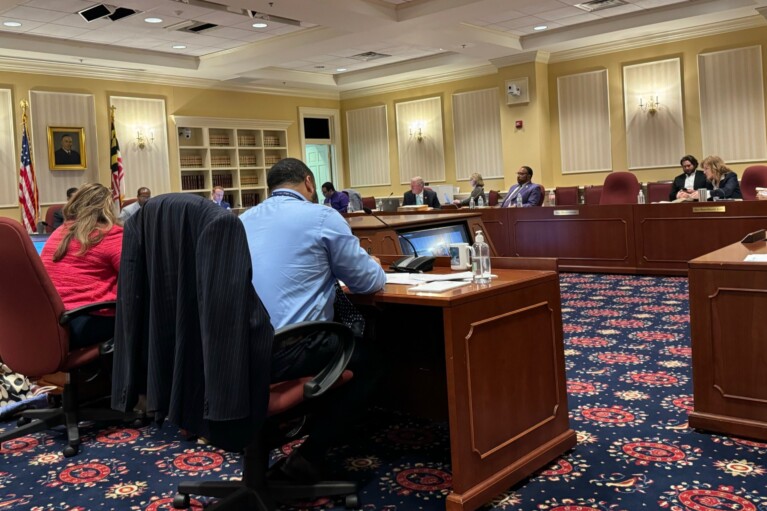With One Week Left in Session, Is Legislation to Fine-Tune Police Reform Still on the Table?

One year after lawmakers passed sweeping police reform bills in Maryland, attempts to fine-tune those reforms have largely withered this General Assembly session.
Lawmakers have revisited some of these policies, but not without charged debate.
Senate Judicial Proceedings Committee Chair William C. Smith Jr. (D-Montgomery) introduced legislation to allow the Independent Investigations Division in the Office of the Attorney General to prosecute police involved in civilian deaths before offering the opportunity to the local State’s Attorney.
“This bill is a product [that] goes against the considered wisdom of every law enforcement official elected or appointed in this state,” Sen. Robert G. Cassilly (R-Harford) said during a debate on the Senate floor Tuesday morning.
Senate Bill 896 would build on a law enacted as part of a package of legislation called the Maryland Police Accountability Act of 2021. One of those measures requires the Attorney General’s Office to investigate deadly police interactions.
Under the current law established last year, the Attorney General’s investigative division has 15 days after completing an investigation to provide a report to the local state’s attorney.
Smith’s bill would give the Attorney General’s Office the ability to prosecute the officer immediately after the investigation. If they elect not to, the local state’s attorney would be able to prosecute.
Smith said the bill is an opportunity for an objective look, case-by-case, at police killings, apart from the local prosecutors and law enforcement who often work together closely.
The Senate approved the measure Tuesday on a tight 25-21 vote. The House has five days left in the session to move the bill.
Several efforts to alter last year’s police reforms or take them further have largely fallen by the wayside.
Sen. Jill P. Carter (D-Baltimore City) and Del. Jheanelle Wilkins (D-Montgomery) sponsored bills that would subject officers to forfeiture of all or part of their pensions if they are found guilty, plead guilty or plead no contest to a crime committed on duty.
The Senate Budget and Taxation Committee heard Carter’s pension bill in late January but has not voted on it. And the House Judiciary Committee heard Wilkins’ bill in March but has not acted on it either.
House Judiciary Committee Vice Chair David Moon (D-Montgomery) has offered legislation to require all law enforcement agencies — including municipal and park police forces — to use body-worn cameras by 2025. Currently only county and state police are mandated to adopt this technology.
Moon’s bill was heard but it also is stalled in committee.
And Sen. Michael A. Jackson (D-Prince George’s), a former county sheriff, sponsored a bill to clarify training, membership, certification and procedural standards for the Maryland Police Training and Standards Commission.
Jackson’s bill passed out of the Senate on a vote of 37-9 after the crossover deadline but hasn’t been assigned to a committee in the House.
During a phone interview Tuesday afternoon, Moon said that typically the session following the passage of sweeping legislation like the Maryland Police Accountability Act of 2021 isn’t spent amending or fine-tuning it.
Usually lawmakers “give time for the changes [they] just made to get worked out and implemented, and I think that’s sort of where we’re at with some of this,” he said. “Many debates are probably not gonna get heard this year if they were basically looked at last year and a decision was made. But never say never.”
However, lawmakers will take a look at errors in the implementation, as they would do under Smith’s bill and legislation to create a task force that would study how to implement Anton’s Law. That bill was meant to increase disclosure of police records under the Maryland Public Information Act, but the rollout has been rocky.
Carter’s bill originally would have limited fees that police agencies can charge for records, but was amended to create a task force to more deeply probe implementation of the law so far.
“In that case, a task force was the right solution,” Carter said Tuesday. “I think there’s a myriad of issues that need to be fleshed out.”
The House Judiciary Committee heard Carter’s bill on the task force Tuesday afternoon.
Meanwhile, Moon said, there is also a push to delay the effective date for parts of the Maryland Police Accountability Act that do not go in force until July 1. Postponing the effective date would give the Maryland Police Training and Standards Commission more time to put regulations in place.
Local jurisdictions are beginning to feel the July 1 time crunch as they try implement new policies.
“This conversation’s not over yet,” Moon said. “We have a few more days left.”
Editor’s note: This story was updated to correct the description of what Senate Bill 896 would do.




 Creative Commons Attribution
Creative Commons Attribution